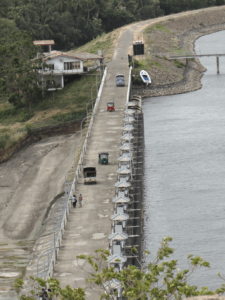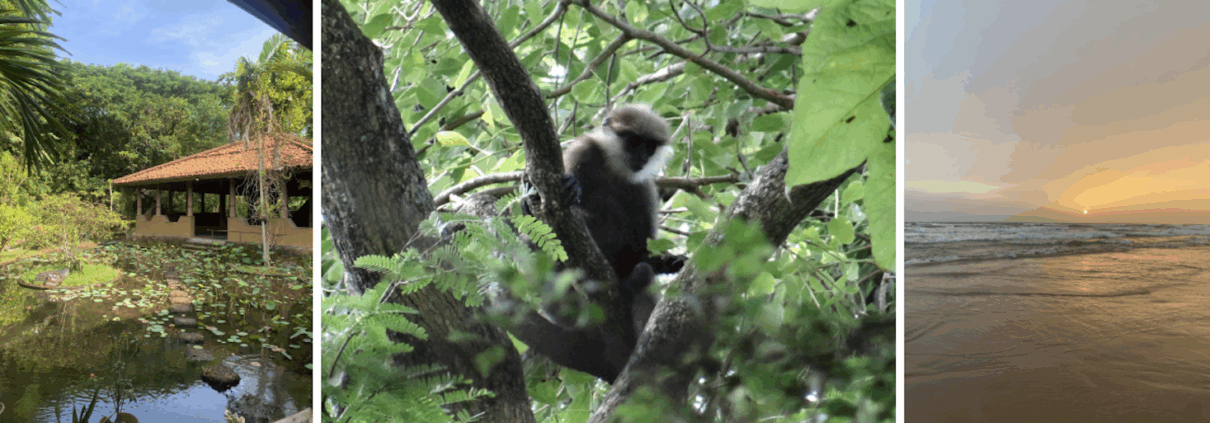Sri Lanka: Traces of the Past, Advancements of the Present
By Jarel Sayles
Taking a leap of faith, traveling beyond the borders of the United States for the first time was an experience that forever changed my life. Immersing myself in lifestyles outside of American culture provided me with a broadened perspective and a far greater desire to positively contribute to our world. In Sri Lanka, where rural life is prominent and religion is deeply embedded in culture, I gained insight into alternative governmental operations and the economic initiatives driving national advancement.
Providing some background, Sri Lanka has had to fight to overcome the negative impacts of a 2009 war, corrupt governmental leaders stealing money, and a debt crisis which has led to a decrease in their currency. With people working extremely hard for extremely low wages, many Sri Lankans have had to resort to leaving the country in order to provide for their families, but this reality has not been accessible to all. Some have been unable to leave due to the difficulty of attaining visas, while also facing the challenge of not being able to afford travel expenses. Facing various economic hardships within the past and present, poverty alleviation in Sri Lanka has become imperative and economic development has become a priority.
 Specifically working with the Sarvodaya Shramadana Movement within Sri Lanka, the primary focus within my internship was to identify ways for expanding community-based tourism, which intends to promote alternative forms of economic development for rural communities. Rural communities are the main focus because Sri Lanka’s main city and primary tourist location of Colombo is not representative of the rest of the island. Community-based tourism seeks to directly provide an experience for tourists or universities that uniquely displays the daily lifestyles for the majority of Sri Lankan people. This includes culinary practices, entrepreneurial endeavors, religion, agricultural practices, leisure activities, and beyond. From those villages providing a service collaboratively with Sarvodaya, the organization also invests funds back into the community, allowing for more development opportunities such as the creation of roads, home improvements, or even water infrastructure.
Specifically working with the Sarvodaya Shramadana Movement within Sri Lanka, the primary focus within my internship was to identify ways for expanding community-based tourism, which intends to promote alternative forms of economic development for rural communities. Rural communities are the main focus because Sri Lanka’s main city and primary tourist location of Colombo is not representative of the rest of the island. Community-based tourism seeks to directly provide an experience for tourists or universities that uniquely displays the daily lifestyles for the majority of Sri Lankan people. This includes culinary practices, entrepreneurial endeavors, religion, agricultural practices, leisure activities, and beyond. From those villages providing a service collaboratively with Sarvodaya, the organization also invests funds back into the community, allowing for more development opportunities such as the creation of roads, home improvements, or even water infrastructure.
Sarvodaya’s community-based tourism program is very recent and the organization has sought to create a program within multiple villages, to diversify the experiences of consumers while also identifying ways for business expansion. The island is divided into 25 districts. I had the privilege of visiting seven of them, and among these districts I stayed in a total of three villages. These locations were distinctly chosen as potential additions to Sarvodaya’s new tourism program, and in order to include them within the program it was vital to experience firsthand what these villages offer. Assessing each village by meeting the people, exploring potential local attractions, examining food selection, and gaining a true sense of what visitors like myself would enjoy was the main goal of these village stays.
While in these villages, I had the opportunity to explore natural waterfalls, enjoy the views of the Indian Ocean, go to ancient temples, see village school systems of all ages, teach English, learn cultural dances, and among many other things I was able to witness the production of various goods such as tea, rubber, coconut oil, rice, and milk. I was also able to observe and assist entrepreneurs who produced clothing, brooms and rakes made from coconut, paper made from guinea grass and banana leaf, cinnamon sticks, and carpets made from coconut husk. This was one of my favorite things to experience while in Sri Lanka. For them to share their craft with me and have the patience to teach me left me beyond amazed and thankful for their time. Not only was it fun but it taught me so much about waste management, precision, efficiency, and hard work in general. Some of these entrepreneurs do everything on their own, within their own household, and you can see the product being used throughout the community. The majority of villagers also grow their own fruits and vegetables locally, so through fairs and local stores they are able to sell their products.
One thing that really stood out to me is, unlike the United States, Sri Lanka has a more autonomous form of governance when it comes to land, trash, natural resources, water, etc. For example, while staying in these villages I learned that residents have been the ones to take initiative on the creation of roads or even creating clean water systems. Residents have also had to find ways to dispose of their own waste, and a common way they do this is by burning their trash themselves. It was a pleasure to be in these villages, meeting so many amazing people and learning how I can embrace things such as community and perseverance within my own country.
Going to Sri Lanka has been one of the most valuable experiences of my life. My internship may have had some challenges but I can for sure say I left the country filled with knowledge and gratitude. This experience exposed me to a culture I was completely unfamiliar with and it has driven me to make a change beyond my own nation. This Global Public Affairs (GPA) program greatly impacted my life not only providing me with work experience but lifelong memories that come with lifelong lessons. I encourage anyone considering this opportunity with GPA to take the leap and do your best to create positive change wherever you may be.



